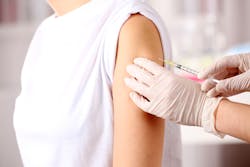mRNA vaccines for COVID-19 generate adverse reactions such as fever and fatigue which are considered normal and are transient in nature. However, there has been a growing fear of taking the mRNA-1273 vaccine prevalent in Japan, due to these unpleasant effects.
Now, there is sparse clinical evidence about the relationship between this incidence of fever and antibody counts, especially after the third dose of the vaccine. Professor Takashi Yorifuji and Assistant Professor Naomi Matsumoto colleagues from Okayama University have investigated this link over a period of time and recently published their findings in a short report in the Journal of Epidemiology.
mRNA vaccines mimic the surface structure of SARS-CoV-2 in the body. Immune cells then treat these as invading pathogens and produce antibodies against them. Thus, antibody counts can be used as a quantitative outcome of the immune system’s response to a vaccine. For their study, the researchers recruited 49 university staff and students as subjects. Only participants who had not previously suffered from COVID-19 (to the best of their knowledge) were selected.
All subjects were surveyed for adverse reactions a week after they received the third mRNA-1273 vaccine dose. Simultaneously, antibody levels of all subjects were measured just before receiving the vaccine, 3 days after, ~1 week after, and finally 1 month after the dose. Using statistical modeling, correlations between the incidence of fever and antibody levels at various time points was stipulated. To account for factors contributing to the onset of fever post-vaccination, the team also looked at sex, age differences, a history of allergy, and the use of antipyretics (fever-reducing drugs) amongst the participants.
The subjects were then classified into a “fever” or “nonfever” group based on the survey results. It was found that the fever group was more likely to be younger (20 to 49 years-old) and had a past history of allergies. Next, antibody levels at different time points in the two groups were analyzed. At 1 week post vaccination, the fever group had substantially higher antibody counts than the nonfever group. However, at 1 month post vaccination there seemed to be no correlation between the incidence of fever and high antibody levels.

